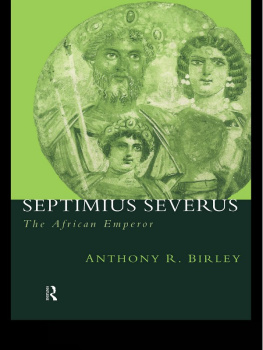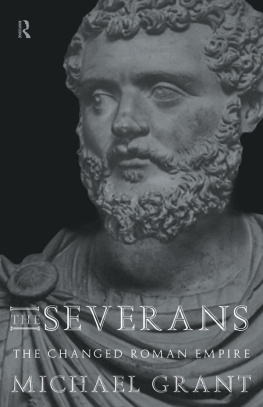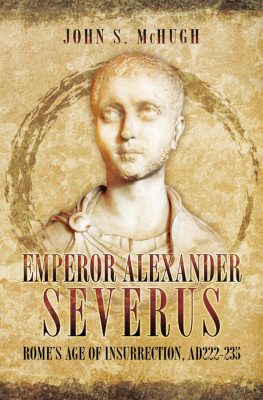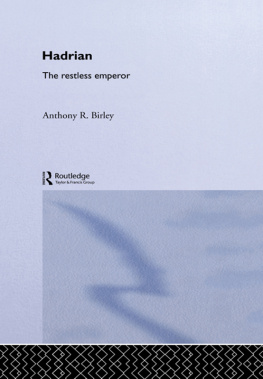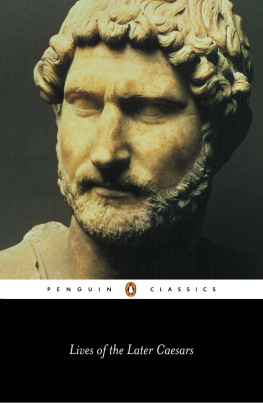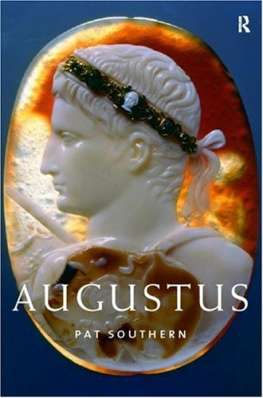SEPTIMIUS SEVERUS
THE AFRICAN EMPEROR
Septimius Severus, the African Emperor, was descended from Phoenician settlers in Tripolitania, and his reign, AD 193211, represents a turning point in Roman history. Anthony R.Birleys biography explores how Roman or otherwise this man was and examines his remarkable background and career.
In the first part of the biography, Anthony R.Birley explores what was African and what was Roman in Septimius background, given that he came from an African city, Lepcis Magna, which prospered under Roman domination. In the second part of the book, Septimius career as a Roman senator in the age of the Antonines is studied, including his second marriage to the Syrian Julia Domna, then the conspiracy to overthrow the deranged emperor Commodus and the dramatic civil wars of 1937 which concluded with Septimius as victor. In the final part of the book Anthony R.Birley examines Septimius reign, most of which was spent in the provinces. Septimius greatly extended the eastern frontiers and returned in triumph to his native Africa in 2023. He died at York after a three-year campaign aimed at reconquering the whole of Scotland.
In this well-illustrated and stimulating biography, Anthony R.Birley looks at the multi-faceted and sometimes conflicting character of this strange and enigmatic emperor. He asks whether Septimius was a typical cosmopolitan bureaucrat, a new Hannibal on the throne of the Caesars or the principal author of the decline of the Roman empire.
Anthony R.Birley is Professor of Ancient History at Heinrich Heine University, Dsseldorf. He previously held a similar post at Manchester University. His other books include three on Roman Britain as well as biographies of Marcus Aurelius and Hadrian.
SEPTIMIUS SEVERUS
The African Emperor
Anthony R.Birley
First published 1971 by Eyre & Spottiswoode
Revised edition published 1988 by B.T.Batsford Ltd
This edition published in the Taylor & Francis e-Library, 2002.
First published in paperback 1999
by Routledge
11 New Fetter Lane, London EC4P 4EE
Simultaneously published in the USA and Canada
by Routledge
29 West 35th Street, New York, NY 10001
1971 and 1988 Anthony R.Birley
The right of Anthony R.Birley to be identified as the Author of this Work has been asserted by him in accordance with the Copyright, Designs and Patents Act 1988
All rights reserved. No part of this book may be reprinted or reproduced or utilised in any form or by any electronic, mechanical, or other means, now known or hereafter invented, including photocopying and recording, or in any information storage or retrieval system, without permission in writing from the publishers.
British Library Cataloguing in Publication Data
A catalogue record for this book is available from the British Library
Library of Congress Cataloguing in Publication Data
A catalogue record for this book has been requested
ISBN 0-415-16591-1 (Print Edition)
ISBN 0-203-02859-7 Master e-book ISBN
ISBN 0-203-14374-4 (Glassbook Format)
List of Illustrations
Plates
Maps
Preface
ONCE THE ROMAN IMPERIAL SYSTEM became well established, it did not matter muchso it can be arguedwho was emperor. As for the Emperor and the Emperors friends, Synesius wrote in a letter, and fortunes dancecertain names shooting up like flames to a great height of glory and being extinguishedthere is complete silence on these things here, our ears are spared from news of that sort. Maybe people know well enough that there always is some Emperor who is alive, because we are reminded of this every year by the tax-collectors. But who the Emperor is, that is not so clear, in fact there are some among us who think Agamemnon is still on the throne. Synesius could make a joke out of the remoteness of Arcadius and the sheltered ignorance of Cyrenaica. But he strongly disapproved, as he told Arcadius in his address OnKingship: the emperor should lead his armies in person, and tour the provinces to see and be seen. Septimius Severus is not known to have visited Cyrenaica; but this is one of the very few parts of the empire that he did not see. For one thing, he was the first emperor born and raised away from Rome and Italy, in his ancestral Tripolitania. His career as a senator took him to Sardinia, Spain, Syria, Gaul, Sicily and Pannonia, with a stay at Athens while out of office. Once he had seized power he spent all but four of his eighteen years as emperor on the move, notably in the east, where he extended Romes borders to the Tigris; in Egypt; the Balkans and Rhineland; Africa; finally remote Britain, where he stayed longer than any other ruler. Such a man deserves close scrutiny, even if it is difficult, impossible no doubt, to get beneath his skin.
His African origin is not the least remarkable aspect of Septimius. As the work of numerous scholars, archaeologists and epigraphists in the main, now makes clear, Tripolitania stood apart from the rest of Roman Africa, deeply conservative after centuries of virtual independence, with its Punic or Libyphoenician identity still strongly apparent when it finally entered Romes orbit under Augustus. No influx of colonial migration disturbed the dominance of the Punic lite; yet they responded with alacrity to Romes presence as a free city Lepcis had won allied status long before. Septimius ancestors became Romans, his grandfather emerges as a knight owning land near Rome and a minor figure in fashionable literary circles of late Flavian Italybut he returned to Lepcis to preside over the culmination of its transformation, into an honorary colonia. Septimius father spent his entire life in Tripolitania, Septimius himself grew up there.
My interest in Septimius goes back a long way. He is a key figure for the student of Roman Britain, and it was a matter of great excitement when Robin Birleys excavations at Carpow on the Tay in 19612 revealed that the site was Severan, with stone principia and praetorium. This made it clear that Septimius really had sought to conquer the whole of Britain (as Dio said), not just to crush Caledonia before returning to the Wall. A few years later I was lucky enough to visit Lepcis Magna, and by an unusual route, coming up across the desert from the Garamantian country, past the Black Mountain and the outpost fort at Bu-Ngem which Septimius built, grateful to reach the coast after the searing heat of the ghibli. Meanwhile I had been plunging into the ocean of the Augustan History, but not insensibly (as Gibbon recalled he had done). I was fortunate to have been guided by Sir Ronald Syme in my first steps through what he has called a Serbonian bog. The Historia Augusta which I abbreviate HA throughout this bookis a problem that must be confronted by any student of the second and third centuries AD. Participation in several of the Colloquia organised by Professor Johannes Straub proved very beneficial. At the first one that I attended the late H.-G.Pflaum urged me to undertake a biography of Septimius. The result, mostly written at Duke University, was published in 1971. It has long been out of print and I have often enough been asked for spare copies by would-be readers. In the meantime a considerable body of new evidence and a mass of new literature have appeared. The invitation to produce a completely new version was thus both welcome and daunting. I have had to be selective, some might call it eclectic, in what I have cited, to avoid excessively ponderous documentation. I have subdivided the bibliography, in some cases by a group of chapters, often chapter by chapter. To a limited extent the bibliographies give a conspectus of the literature, but I have refrained from listing a fair number of standard works if they have not been expressly cited in the notes.

